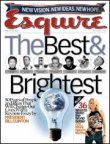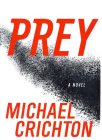 |
E-mail Locus
Subscribe to Locus Magazine
|
 |
 |
SFFH Reviews and Articles in General Publications
Wednesday 27 November 2002

 §
The New Yorker December 2, 2002
§
The New Yorker December 2, 2002
Oliver Morton reviews Michael Crichton's Prey, about runaway swarms of nanomachines.
If the swarms have a drawback, it is that their implacable nastiness comes with no inner life. This will not be a problem for the special-effects people, whose programs do not, as yet, ask to be supplied with a motivation. But it limits the book's impact. The swarms aren't characters; they are created simply for opposition, like most of Crichton's adversaries, and the only satisfactory ending is for them to lose. "Prey" duly tells the story of a crisis contained.
This kind of resolution, too, is something of a Crichton trademark. He's forever describing things that could change the world-but don't. The Andromeda strain of space germs mutates into harmlessness and goes away; the lost city of the Congo is wiped from the map by lava; in "Sphere," the discoverers of the extraterrestrial artifact of untold power use that power to wish it into retroactive nonexistence. The fact that Crichton has no interest in showing what might have happened is what makes him a writer of suspense fiction, rather than of science fiction. A science-fiction writer would naturally want to see what would happen if the technologies stayed out of control (as most do), and might even want to ask whether the consequences would be all bad (as they often aren't). Might not free-range dinosaurs make Costa Rica an even more interesting place than it is today? What if nanoswarms offered promise as well as peril? "Prey," with its kill-them-all-and-get-out approach, is neither as frightening nor as fascinating as Greg Bear's novelette of twenty years ago, "Blood Music," in which the characters, transformed by the nanotechnology within them, become both far more and much less than human.
But then Crichton's essential conservatism may well be the secret of his success. You get a glimpse of something strange and unsettling, but you don't have to live with anything worse than the chance it might happen again. His goal is simply to convey a compelling and dangerous idea as quickly and noisily as possible. It's often said that Crichton's novels read like movies. In fact, they're more like trailers, previews of coming destructions.
 §
Time December 2, 2002
§
Time December 2, 2002
Feeding on Fantasy by Lev Grossman is a sidebar essay to the magazine's rave coverage of the next LOTR film, The Two Towers. The theme: pop culture sci-fi is giving way to pop culture fantasy.
Popular culture is the most sensitive barometer we have for gauging shifts in the national mood, and it's registering a big one right now. Our fascination with science fiction reflected a deep collective faith that technology would lead us to a cyberutopia of robot butlers serving virtual mai tais. With The Two Towers, the new installment of The Lord of the Rings trilogy, about to storm the box office, we are seeing what might be called the enchanting of America. A darker, more pessimistic attitude toward technology and the future has taken hold, and the evidence is our new preoccupation with fantasy, a nostalgic, sentimental, magical vision of a medieval age. The future just isn't what it used to be-and the past seems to be gaining on us.
 §
Esquire December 2002
§
Esquire December 2002
The magazine's "Best and Brightest" people who are changing our world (not online) include screenwriter Charlie Kaufman (page 139), whose upcoming films are Adaptation and The Orchid Thief; and Vernor Vinge (page 158), harbinger of the Singularity...
It all sounds like, well, science fiction, but the truth is that Vinge's ideas are taken seriously by a wide range of academic, business, and government institutions. People pay serious money to have Vinge and other scientists in the field lay out possible scenarios. There are heated debates over the details of the singularity, with a group of scholars headed by Francis Fukuyama (of "end of history" fame) claiming that a biological revolution will create a singularity before computers can do it. But ten years after Vinge first broached the idea, this remains one of the leading mainstream visions for where the world is headed.
§
Los Angeles Times Magazine Sunday November 24, 2002
Go West, Young Mutant summarizes Southern California's role in the development of science fiction, which is being celebrated at an exhibit at the Fullerton Museum Center in Fullerton, CA through January 26, 2003.
Tuesday 26 November 2002

§
New York Times Book Review November 24, 2002
The paper runs another essay about Philip K. Dick (there was an editorial observer piece by Brent Staples back in July), by Laura Miller, about how we're living in PKD's world, not just in the movies.
Dickian devices and themes -- implanted memories, commodified identities, simulacra -- haunt contemporary literary fiction as well. The naming of years after corporate sponsors in David Foster Wallace's ''Infinite Jest''; the downtrodden, stigmatized souls in George Saunders's futuristic short stories, with their degrading theme park jobs; the dream worlds Haruki Murakami's characters tumble into and out of -- all partake of Dick's peculiar mixture of wrenched ontology and underdog sympathies.
Also in this week's Review, a short review by Taylor Antrim [scroll down] of Jonathan Carroll's White Apples.
 §
New York Times Book Review November 24, 2002
§
New York Times Book Review November 24, 2002
Michael Crichton's new novel, Prey (HarperCollins), in stores Monday, gets due notice here from Jim Holt...
Crichton is not particularly interested in the inner man. When he writes a book, he says, it's as though he were watching a movie: he sees his characters externally. These characters may talk in cliches, especially the unprintable kind, when they get into tight spots, but then, so do actual people. As for his alarmist pegs, Crichton genuinely believes there is good reason to be alarmed at the prospect of greedy and unscrupulous people getting their hands on powerful and unpredictable technologies. And he deploys his considerable storytelling talents to make us feel this too.
...and from David Kipen, reviewing in San Francisco Chronicle, who thinks Crichton's career has been going downhill ever since The Great Train Robbery in 1975:
If only "things never turn out the way you think they will" applied as well to Crichton's [new] novel. Sadly, "Prey" turns out almost exactly the way we think it will, with "breakaway robotic nanoswarms" infecting everyone around Jack and turning them into homicidal, edgy maniacs.
 §
Washington Post Book World November 24, 2002
§
Washington Post Book World November 24, 2002
This week's issue has several essays and reviews on fantastic books:
- Michael Dirda (who returned from sabbatical a couple weeks ago) essays on Terry Pratchett's latest.
For some reason, though, Pratchett hasn't attracted the right attention in the United States. His work is seldom reviewed at length, and even the well-read haven't heard of him, or, if they have, their brains have lodged the Discworld series in the pigeonhole labeled "cutesy fantasy" and then dismissed it. In truth, Pratchett's work is almost impossible to describe without making it sound childish, sickly sweet or twee. But there's nothing soft and cuddly about it: Think Monty Python or "The Simpsons" rather than Harry Potter; satirical rather than silly.
...
Night Watch turns out to be an unexpectedly moving novel about sacrifice and responsibility, its final scenes leaving one near tears, as these sometime Keystone Kops, through simple humanity, metamorphose into the Seven Samurai. Terry Pratchett may still be pegged a comic novelist, but as Night Watch shows, he's a lot more. In his range of invented characters, his adroit storytelling and his clear-eyed acceptance of humankind's foibles, he reminds me of no one in English literature so much as Geoffrey Chaucer. No kidding.
- Dirda also provides a short review of Brian Thomsen's anthology The American Fantasy Tradition (Tor).
- Abby McGanney Nolan
reviews YA novels by Clive Barker, Cornelia Funke, Lloyd Alexander (The Rope Trick), William NIcholson (Firesong), and Sylvia Waugh (Earthborn).
- And Elizabeth Ward reviews another YA novel, William Sleator's Parasite Pig (Dutton), sequel to 1984's Interstellar Pig.
Naturally, I showed Parasite Pig to my son. "I don't remember Interstellar Pig being this cheesy," he said, wincing at the clunky dialogue. ("I looked at my watch. 'Yikes! I've got to get back to work or I'll be in big trouble.' ") He's right about Parasite Pig, unfortunately. The dialogue is deficient, the characterization right out of "Scooby Doo," the budding romance inane. What propels it, or not, is its ideas.
But here's the odd thing. Interstellar Pig was a cheesy, idea-driven book, too. My son didn't remember the cheesiness because he was so mesmerized by the idea -- that fabulous, fatal game -- at the heart of it. He didn't even remember the ending, in which Barney discovers that the game isn't fatal, after all, merely a ploy by The Piggy to keep himself amused. The original idea ran away with the book. Sleator must have known a sequel would need to do more than just recycle it; it would need its own brilliant shaping concept. Here are two readers reporting that interstellar parasitism doesn't quite make it.
- And here's Fiona Kelleghan reviewing Maria Tatar's anthology The Annotated Classic Fairy Tales (Norton): "a truly beautiful book".
Tuesday 19 November 2002

§
New York Times Book Review November 17, 2002
This week's Book Review has a special Children's Books section with:
- Robert Lipsyte reviewing Michael Chabon's Summerland: "A most valuable novelist is allowed to have an off season, but he can't make a Hobbit of it."
- Sam Swope reviewing several editions of Pinocchio, including the Gris Grimly-illustrated edition from Tor/Starscape.
-
 Rebecca Pepper Sinkler reviewing Cornelia Funke's The Thief Lord: "...what lifts this radiant novel beyond run-of-the-mill fantasy is its palpable respect for both the struggle to grow up and the mixed blessings of growing old."
Rebecca Pepper Sinkler reviewing Cornelia Funke's The Thief Lord: "...what lifts this radiant novel beyond run-of-the-mill fantasy is its palpable respect for both the struggle to grow up and the mixed blessings of growing old."
- Roger Sutton reviewing Nancy Farmer's The House of the Scorpion: "Although ''The House of the Scorpion'' is nominally science fiction, its conventions are primarily those of realistic fiction, with more than a whiff of the old-fashioned adventure tale, the kind we rarely see these days outside the fantasy genre."
- Elizabeth Devereaux briefly reviewing [scroll down] M.T. Anderson's Feed: "Subversive, vigorously conceived, painfully situated at the juncture where funny crosses into tragic..."
The main section has a long review by Brooke Allen of Katharine M. Rogers's L. Frank Baum: Creator of Oz (St. Martin's).
Sunday 10 November 2002

 §
New York Times Book Review November 10, 2002
§
New York Times Book Review November 10, 2002
Gerald Jonas's November SF column
covers Margaret Wander Bonanno's Preternatural3 (Tor)...
The uncertain nature of the relationship between creator and creation is very much the point of this stylish, difficult and surprisingly moving work of metafiction.
...John Barnes's The Duke of Uranium (Warner Aspect), and, briefly, James Patrick Kelly's Strange But Not a Stranger (Golden Gryphon).
 §
The Guardian November 9, 2002
§
The Guardian November 9, 2002
A.S. Byatt reviews Terry Pratchett's Night Watch (Doubleday UK).
Human beings love stories because they safely show us beginnings, middles and ends. Our ends are Death and, as I said, Pratchett likes to move wild laughter in its throat. His real horrors are the Undead, and the bad witch trapped in a hall of mirrors unable to find the door to life or death, and the ghouls who try to invade from beyond the confines of space-time. ... Stories both trap people in a continuum and console them with images of beginnings and ends. Pratchett is a master storyteller.
 §
USA Today 31 October 2002
§
USA Today 31 October 2002
The sidebar item appeared alongside USAT's weekly bestseller list, propitiously on the first day of this year's World Fantasy Convention, where Peter Straub's Conjunctions: 39, New Wave Fabulists went on sale.
[Straub] wishes more professors and critics would judge writers by their writing, not just their subject matter, whether it be horror, science fiction or crime.
He devised a new category, "post-genre cult writers," such as Jonathan Lethem (Motherless Brooklyn), Neil Gaiman (Sandman) and Kelly Link (Stranger Things Happen), whose "stuff is literature, partly because of what it draws from its genre roots."
A discussion with novelist Bradford Morrow, who edits a literary magazine, Conjunctions, published by Bard College, led Morrow to offer Straub a chance to be guest editor. ...
 §
Washington Post Book World November 3, 2002
§
Washington Post Book World November 3, 2002
Jim Krusoe reviews Jonathan Carroll's White Apples (Tor).
In other words, what we have here is a novel that combines As I Lay Dying, The Omen and The Hitchhiker's Guide to the Galaxy, and if this sounds awful, it's not. Actually it's pretty entertaining, largely because of Carroll's amazing ability to alternate between flimflam and truly wondrous effects. Part of the time he's really, really smart, and then at others so cute that this reader just wanted to hurl his copy of White Apples across the room.
Also:
- Michael Berry reviews Clive Barker and Isabel Allende
- Roz Kaveney reviews Priest's The Separation
- Jenny Blackford reviews the final volume of Cecilia Dart-Thornton's Bitterbynde trilogy
- Review of a new "mythographical" book by Marina Warner, Fantastic Metamorphoses, Other Worlds
October Field Inspections
|










